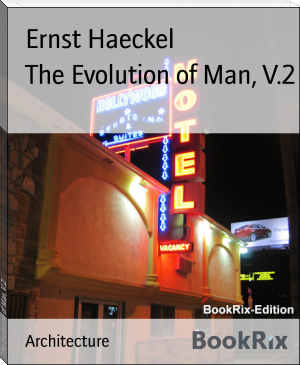The Brethren, H. Rider Haggard [ebooks that read to you .txt] 📗

- Author: H. Rider Haggard
Book online «The Brethren, H. Rider Haggard [ebooks that read to you .txt] 📗». Author H. Rider Haggard
The brethren were seated together in a little place apart in the bow of the ship, and engaged, Godwin in reading from an Arabic translation of the Gospels made by some Egyptian monk, and Wulf in following it with little ease in the Latin version. Of the former tongue, indeed, they had acquired much in their youth, since they learned it from Sir Andrew with Rosamund, although they could not talk it as she did, who had been taught to lisp it as an infant by her mother. Knowing, too, that much might hang upon a knowledge of this tongue, they occupied their long journey in studying it from such books as they could get; also in speaking it with a priest, who had spent many years in the East, and instructed them for a fee, and with certain Syrian merchants and sailors.
"Shut the book, brother," said Wulf; "there is Lebanon at last," and he pointed to the great line of mountains revealing themselves dimly through their wrappings of mist. "Glad I am to see them, who have had enough of these crooked scrolls and learnings."
"Ay," said Godwin, "the Promised Land."
"And the Land of Promise for us," answered his brother. "Well, thank God that the time has come to act, though how we are to set about it is more than I can say."
"Doubtless time will show. As our uncle bade, we will seek out this Sheik Jebal---"
"Hush!" said Wulf, for just then some merchants, and with them a number of pilgrims, their travel-worn faces full of rapture at the thought that the terrors of the voyage were done, and that they were about to set foot upon the ground their Lord had trodden, crowded forward to the bow to obtain their first view of it, and there burst into prayers and songs of thanksgiving. Indeed, one of these men--a trader known as Thomas of Ipswich--was, they found, standing close to them, and seemed as though he listened to their talk.
The brethren mingled with them while this same Thomas of Ipswich, who had visited the place before, or so it seemed, pointed out the beauties of the city, of the fertile country by which it was surrounded, and of the distant cedar-clad mountains where, as he said, Hiram, King of Tyre, had cut the timber for Solomon's Temple.
"Have you been on them?" asked Wulf.
"Ay, following my business," he answered, "so far." And he showed them a great snow-capped peak to the north. "Few ever go further."
"Why not?" asked Godwin.
"Because there begins the territory of the Sheik Al-je-bal"--and he looked at them meaningly--"whom," he added, "neither Christian nor Saracen visit without an invitation, which is seldom given."
Again they inquired why not.
"Because," answered the trader, still watching them, "most men love their lives, and that man is the lord of death and magic. Strange things are to be seen in his castle, and about it lie wonderful gardens inhabited by lovely women that are evil spirits, who bring the souls of men to ruin. Also, this Old Man of the Mountain is a great murderer, of whom even all the princes of the East are terrified, for he speaks a word to his fedais--or servants --who are initiated, and they go forth and bring to death any whom he hates. Young men, I like you well, and I say to you, be warned. In this Syria there are many wonders to be seen; leave those of Masyaf and its fearful lord alone if you desire to look again upon--the towers of Lincoln.
"Fear not; we will," answered Godwin, "who come to seek holy places--not haunts of devils."
"Of course we will," added Wulf. "Still, that country must be worth travelling in."
Then boats came out to greet them from the shore--for at that time Beirut was in the hands of the Franks--and in the shouting and confusion which followed they saw no more of this merchant Thomas. Nor did they seek him out again, since they thought it unwise to show themselves too curious about the Sheik Al-je-bal. Indeed, it would have been useless, since that trader was ashore two full hours before they were suffered to leave the ship, from which he departed alone in a private boat.
At length they stood in the motley Eastern crowd upon the quay, wondering where they could find an inn that was quiet and of cheap charges, since they did not wish to be considered persons of wealth or importance. As they lingered here, somewhat bewildered, a tall, veiled woman whom they had noted watching them, drew near, accompanied by a porter, who led a donkey. This man, without more ado, seized their baggage, and helped by other porters began to fasten it upon the back of the donkey with great rapidity, and when they would have forbidden him, pointed to the veiled woman.
"Your pardon," said Godwin to her at length and speaking in French, "but this man--"
"Loads up your baggage to take it to my inn. It is cheap, quiet and comfortable--things which I heard you say you required just now, did I not?" she answered in a sweet voice, also speaking in good French.
Godwin looked at Wulf, and Wulf at Godwin, and they began to discuss together what they should do. When they had agreed that it seemed not wise to trust themselves to the care of a strange woman in this fashion, they looked up to see the donkey laden with their trunks being led away by the porter.
"Too late to say no, I fear me," said the woman with a laugh, "so you must be my guests awhile if you would not lose your-baggage. Come, after so long a journey you need to wash and eat. Follow me, sirs, I pray you."
Then she walked through the crowd, which, they noted, parted for her as she went, to a post where a fine mule was tied. Loosing it, she leaped to the saddle without help, and began to ride away, looking back from time to time to see that they were following her, as, indeed, they must.
"Whither go we, I wonder," said Godwin, as they trudged through the sands of Beirut, with the hot sun striking on their heads.
"Who can tell when a strange woman leads?" replied Wulf, with a laugh.
At last the woman on the mule turned through a doorway in a wall of unburnt brick, and they found them selves before the porch of a white, rambling house which stood in a large garden planted with mulberries, oranges and other fruit trees that were strange to them, and was situated on the borders of the city.
Here the woman dismounted and gave the mule to a Nubian who was waiting. Then, with a quick movement she unveiled herself, and turned towards them as though to show her beauty. Beautiful she was, of that there could be no doubt, with her graceful, swaying shape, her dark and liquid eyes, her rounded features and strangely impassive countenance. She was young also--perhaps twenty-five, no more-- and very fair-skinned for an Eastern.
"My poor house is for pilgrims and merchants, not for famous knights; yet, sirs, I welcome you to it," she said presently, scanning them out of the corners of her eyes.
"We are but squires in our own country, who make the pilgrimage," replied Godwin. "For what sum each day will you give us board and a good room to sleep in?"
"These strangers," she said in Arabic to the porter, "do not speak the truth."
"What is that to you?" he answered, as he busied himself in loosening the baggage. "They will pay their score, and all sorts of mad folk come to this country, pretending to be what they are not. Also you sought them--why, I know not--not they you."
"Mad or sane, they are proper men," said the impassive woman, as though to herself, then added in French, "Sirs, I repeat, this is but a humble place, scarce fit for knights like you, but if you will honour it, the charge is--so much."
"We are satisfied," said Godwin, "especially," he added, with a bow and removing the cap from his head, "as, having brought us here without leave asked, we are sure that you will treat us who are strangers kindly."
"As kindly as you wish--I mean as you can pay for," said the woman. "Nay, I will settle with the porter; he would cheat you."
Then followed a wrangle five minutes long between this curious, handsome, still-faced woman and the porter who, after the eastern fashion, lashed himself into a frenzy over the sum she offered, and at length began to call her by ill names.
She stood looking at him quite unmoved, although Godwin, who understood all, but pretended to understand nothing, wondered at her patience. Presently, however, in a perfect foam of passion he said, or rather spat out: "No wonder, Masouda the Spy, that after hiring me to do your evil work, you take the part of these Christian dogs against a true believer, you child of Al-je-bal!"
Instantly the woman seemed to stiffen like a snake about to strike.
"Who is he?" she said coldly. "Do you mean the lord--who kills?" And she looked at him--a terrible look.
At that glance all the anger seemed to go out of the man.
"Your pardon, widow Masouda," he said. "I forgot that you are a Christian, and naturally side with Christians. The money will not pay for the wear of my ass's hoofs, but give it me, and let me go to pilgrims who will reward me better."
She gave him the sum, adding in her quiet voice: "Go; and if you love life, keep better watch over your words."
Then the porter went, and now so humble was his mien that in his dirty turban and long, tattered robe he looked, Wulf thought, more like a bundle of rags than a man mounted on the donkey's back. Also it came into his mind that their strange hostess had powers not possessed by innkeepers in England. When she had watched him through the gate, Masouda turned to them and said in French:
"Forgive me, but here in Beirut these Saracen porters are extortionate, especially towards us Christians. He was deceived by your appearance. He thought that you were knights, not simple pilgrims as you avow yourselves, who happen to be dressed and armed like knights beneath your gambesons; and," she added, fixing her eyes upon the line of white hair on Godwin's head where the sword had struck him in the fray on Death Creek quay, "show the wounds of knights, though it is true that a man might come by such in any brawl in a tavern. Well, you are to pay me a good price, and you shall have my best room while it pleases you to honour me with your company. Ah! your baggage. You do not wish to leave it. Slave. come here."
With startling suddenness the Nubian who had led away the mule appeared, and took up some of the packages. Then she led them down a passage into a large, sparsely-furnished room with high windows, in which were two beds laid on the cement floor, and asked them if it





Comments (0)